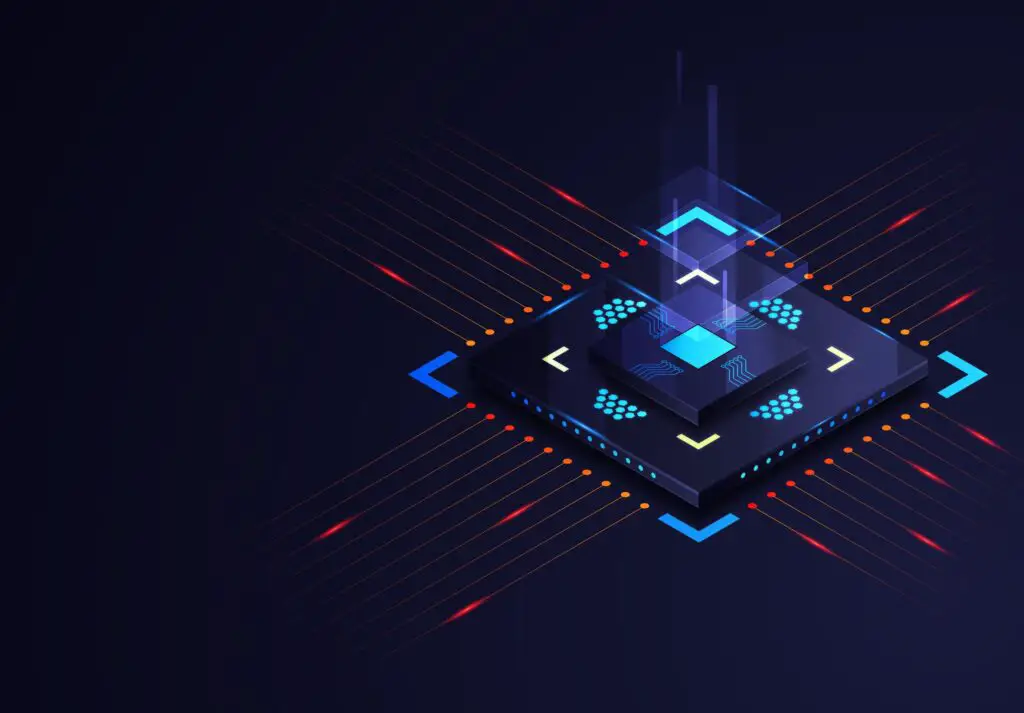Quantum computing is an emerging field of study that harnesses the principles of quantum mechanics to perform computational tasks with unprecedented power and efficiency. Traditional computers, based on classical bits, process information in binary form (0s and 1s), while quantum computers use quantum bits or qubits, which can exist in superposition states of 0 and 1 simultaneously. This unique property, combined with the phenomenon of quantum entanglement, enables quantum computers to tackle complex problems that are intractable for classical computers. In this article, we will explore the fundamentals of quantum computing, its potential applications, and the challenges it faces.
The Building Blocks of Quantum Computing
Qubits: The Quantum Counterparts of Classical Bits
In quantum computing, the basic unit of information is the qubit. Unlike classical bits, which can only exist in either a 0 or 1 state, qubits can be in a superposition of both states simultaneously. This superposition property allows quantum computers to perform computations on multiple possibilities simultaneously, vastly increasing computational power.
Quantum Entanglement: Spooky Action at a Distance
Quantum entanglement is a phenomenon where two or more qubits become correlated in such a way that the state of one qubit is instantly connected to the state of the other, regardless of the distance between them. This property enables quantum computers to process information in a highly parallel and interconnected manner, leading to powerful computational capabilities.
Quantum Gates: Manipulating Qubits
Quantum gates are the building blocks of quantum circuits. These gates allow operations to be performed on qubits, such as changing their state, entangling them, or applying logical operations. By applying a series of quantum gates, complex computations can be executed on the quantum computer.
Quantum Algorithms: Unleashing Quantum Speedup
Quantum algorithms are specifically designed to take advantage of the unique properties of quantum computers. One notable example is Shor’s algorithm, which can factor large numbers exponentially faster than classical algorithms. Quantum algorithms have the potential to revolutionize cryptography, optimization problems, machine learning, and simulations of quantum systems.
Quantum Computing Applications
Cryptography: Breaking the Unbreakable
Quantum computing has the potential to break many of the cryptographic algorithms currently in use. Shor’s algorithm, for instance, can efficiently factor large numbers, which forms the basis of many encryption schemes. However, quantum computing also offers solutions to develop post-quantum cryptography, resistant to attacks from quantum computers.
Optimization: Solving Complex Problems
Quantum computing has the ability to solve optimization problems more efficiently than classical computers. By leveraging quantum algorithms such as the Quantum Approximate Optimization Algorithm (QAOA), quantum computers can find optimal solutions for complex optimization problems, enabling advancements in fields like logistics, scheduling, and supply chain management.
Drug Discovery: Accelerating the Search for New Medicines
The process of discovering new drugs is incredibly complex and time-consuming. Quantum computing can simulate the behavior of molecules and atoms, allowing researchers to better understand chemical reactions, predict properties of new compounds, and accelerate the discovery of novel drugs. Quantum simulations hold great potential for advancing the field of pharmaceutical research.
Machine Learning: Unlocking Hidden Patterns
Machine learning is a rapidly evolving field that benefits from the computational power of quantum computing. Quantum machine learning algorithms, such as the Quantum Support Vector Machine (QSVM) and Quantum Neural Networks (QNN), leverage the unique properties of qubits to process and analyze large datasets more efficiently. Quantum machine learning has the potential to uncover hidden patterns and correlations in data, leading to improved predictive models, data clustering, and anomaly detection.
Simulating Quantum Systems: Understanding the Unobservable
Quantum systems are notoriously difficult to simulate using classical computers, especially as the number of particles increases. Quantum computers, on the other hand, can naturally simulate quantum systems, providing insights into quantum chemistry, materials science, and fundamental physics. These simulations can shed light on the behavior of molecules, the properties of materials, and the dynamics of quantum particles, enabling advancements in various scientific fields.
Financial Modeling: Optimizing Investment Strategies
Quantum computing can revolutionize financial modeling by efficiently analyzing large datasets and optimizing complex investment strategies. Quantum algorithms can perform portfolio optimization, risk assessment, option pricing, and portfolio rebalancing more effectively than classical approaches. This has the potential to enhance the accuracy and efficiency of financial decision-making, benefiting individuals, businesses, and the overall economy.
Challenges and Future Directions
Quantum computing faces several challenges that need to be overcome for its widespread adoption and realization of its full potential. These challenges include:
- Hardware Stability: Quantum systems are prone to errors caused by environmental noise and imperfections in the hardware. Developing error-correcting codes and more stable qubits is crucial to improving the reliability of quantum computers.
- Scalability: Current quantum computers have limited numbers of qubits, which restricts the complexity of computations they can perform. Scaling up quantum systems while maintaining their coherence and minimizing errors is a significant challenge in the field.
- Error Correction: Quantum error correction is vital for mitigating the effects of noise and errors in quantum computations. Developing efficient error correction codes that can handle errors and preserve the integrity of quantum information is a key area of research.
- Algorithm Design: Designing quantum algorithms that harness the power of quantum computing efficiently is a complex task. Developing new quantum algorithms, optimizing existing ones, and finding quantum-classical hybrid approaches are ongoing areas of exploration.
- Integration with Classical Computing: Integrating quantum computers with classical computing infrastructure and algorithms is essential for practical applications. Bridging the gap between quantum and classical systems will be crucial to realizing the full potential of quantum computing.
Conclusion
Quantum computing holds the promise of revolutionizing various fields by harnessing the power of quantum mechanics. With its ability to process information in parallel and leverage quantum properties such as superposition and entanglement, quantum computers have the potential to solve problems that are infeasible for classical computers. From cryptography and optimization to drug discovery and scientific simulations, the applications of quantum computing are far-reaching.
While there are still challenges to overcome, researchers and scientists around the world are making significant strides in developing the hardware, algorithms, and applications of quantum computing. As the field continues to progress, we can look forward to a future where quantum computers unlock new possibilities, transforming industries, accelerating scientific discovery, and pushing the boundaries of computation.
FAQs
Q: How is quantum computing different from classical computing?
A: Quantum computing differs from classical computing in several ways. While classical computers use bits to represent information as 0s or 1s, quantum computers use qubits, which can exist in superposition states of 0 and 1 simultaneously. Additionally, quantum computers leverage the principles of quantum entanglement and interference to perform computations on multiple possibilities simultaneously, enabling them to solve certain problems much faster than classical computers.
Q: What are the advantages of quantum computing?
A: Quantum computing offers several advantages over classical computing. It has the potential to solve complex problems exponentially faster, such as factoring large numbers and solving optimization problems. Quantum computing can also simulate quantum systems more accurately, leading to advancements in fields like materials science, drug discovery, and cryptography. Furthermore, quantum computing has the ability to uncover hidden patterns in data and enhance machine learning algorithms.
Q: Are quantum computers available for commercial use?
A: Quantum computers are still in the early stages of development, and large-scale, fault-tolerant quantum computers suitable for commercial use are not yet widely available. However, several companies and research institutions are actively working on building more powerful and stable quantum computers. Quantum computing is expected to become more accessible in the future as advancements are made in hardware, software, and error correction techniques.
Q: What are the major challenges in quantum computing?
A: Quantum computing faces various challenges on the path to its widespread adoption. Some of the major challenges include decoherence and noise, which cause errors in quantum computations. Scaling up quantum systems while maintaining their coherence and stability is another significant challenge. Additionally, developing efficient error correction codes, designing quantum algorithms, and integrating quantum and classical computing are ongoing areas of research.
Q: How can quantum computing impact cryptography?
A: Quantum computing has the potential to impact cryptography significantly. Shor’s algorithm, a quantum algorithm, can efficiently factor large numbers, which forms the basis of many encryption schemes. This means that certain cryptographic algorithms currently considered secure could be vulnerable to attacks by quantum computers. However, post-quantum cryptography, which aims to develop encryption schemes resistant to attacks from quantum computers, is being actively researched.
Q: When can we expect practical applications of quantum computing?
A: While practical applications of quantum computing are still in the early stages, researchers and organizations are actively exploring its potential in various fields. It has already shown promise in areas such as optimization, scientific simulations, and machine learning. As the field progresses and more powerful and stable quantum computers are developed, we can expect to see practical applications emerging in the coming years.







